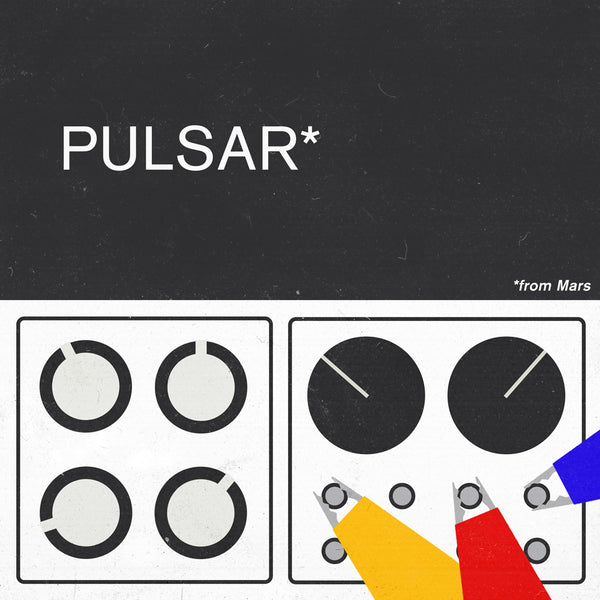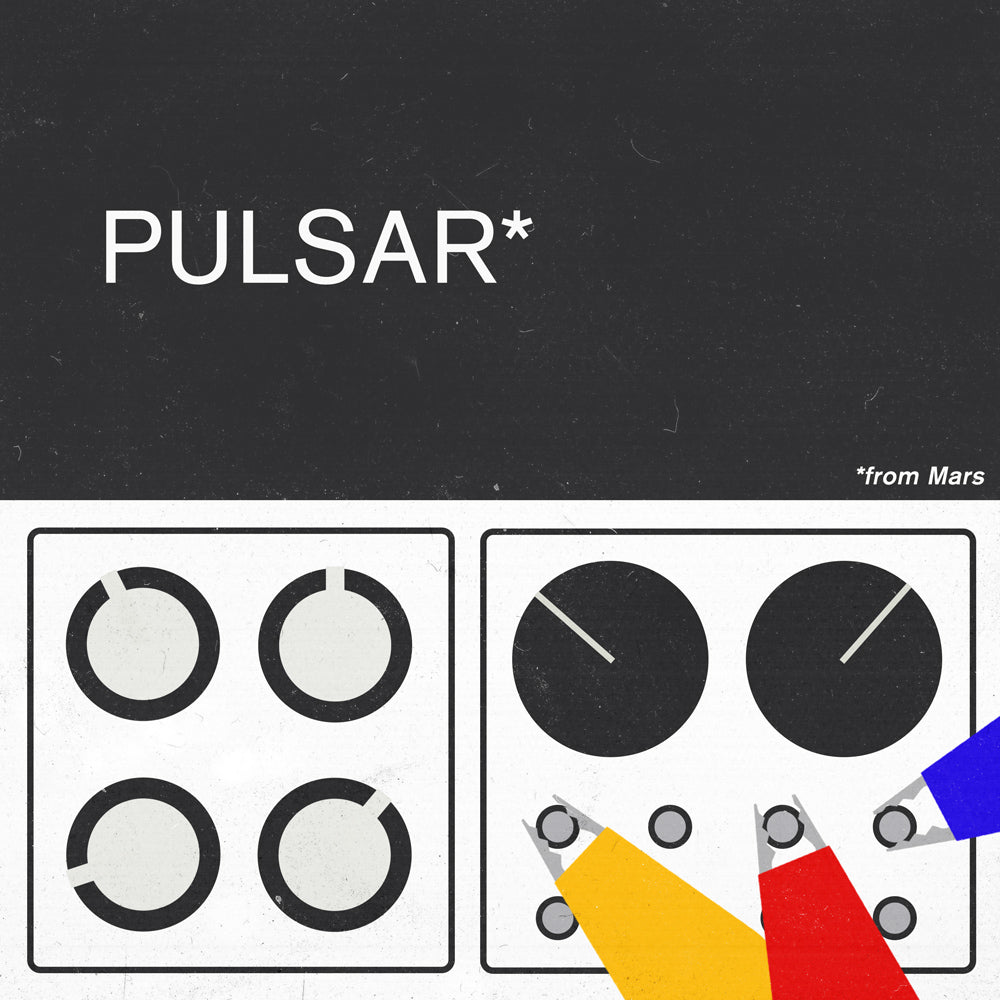PULSAR FROM MARS
$29.00 $14.50
Controlled Chaos From Our Favorite Modern Drum Machine
The Pulsar 23 is a semi-modular, analog drum machine from SOMA Laboratories, and the second in their line of "organismic" synthesizers. Despite its intimidating look, this mashup of classic and modern analog synthesis provides immediate fun and inspiration, so it's no wonder it was your #1 choice for what we should sample next! (via a survey we sent out earlier this year).
So much more than just blips and beeps, the Pulsar's 23 modules give this machine an un-rivaled, vast sonic pallet that allowed us to sculpt some of the most unique loops and one-hits we've ever made.

A Complex Yet Familiar Architecture
Having a Pulsar 23 is like having an entire modular drum rig in a dedicated desktop format. While it sports four channels with unique sound generators labeled BD, Bass, SD, and HH, we quickly found these names to be purely suggestive, as the machine is capable of generating a near infinite variety of sounds, due to its comprehensive patching capabilities.
Patching is done via Alligator clips, which, while tedious, allow for easy multing (using one source for more than one patch). The connections are conductive, so you can use your hands to live-circuit-bend, creating interesting cross modulations!

In addition to fully featured analog synthesis, the Pulsar sports a characterful master distortion, perfect for smashing transients, and an equally vibey FX processor with multiple delays and reverbs.
Experimenting as Beginners
Before doing any research, we sat down with the Pulsar and connected clips randomly, cooking up batches of tangled, patch-cable-spaghetti along the way. Of course, we couldn't resist Soma's aptly labeled "WTF?" and "OMG!" parameters!

Surprisingly, this yielded great results! Our first impression: the Pulsar has a rich assortment of sounds that can quickly go from clean, snappy analog transients, to distorted and aggressive modular chaos, to ambient, soft and intricate, drifty tones.
Becoming Experts
But to create truly interesting flavors, we'd need to become masters of this machine. With hour long youtube tutorial videos *per channel*, this was a somewhat daunting, but highly rewarding process, as it provided a method to our madness and led to the most interesting sounds.
In the following patch, we start with a straight-forward bass drum, modulating the tuning with an envelope to create a classic "dive" sound. The echo FX you hear is the bass channel, sent to the band pass delay (with a lot of feedback), while manually sweeping the low pass filter and Warp knob.
The short, clicky hi hats are created from the clock divider, while the open hi hat is played in manually, and the entire channel's high pass filter is modulated with a slow LFO. Finally, the snare's Release and FX send are modulated by hand, to give the entire beat more complexity and continuous energy ⚡️
Creating The Loops
It was immediately clear the best way to authentically capture the Pulsar in a sample pack was through loops like you hear above. So, we plugged it into our Studer 962 console, recording the main out (dialing in distortion to taste), and individual outs for the 4 channels and 2 effects. To retain the sound of the Pulsar, no additional processing was used.
Engaging the internal rhythm generators, punching in our own sequences, and triggering the Bass channel chromatically via midi gave us all the flexibility we needed to create a range of bangin' Pulsar loops. Opting for a variety of long and short-form grooves, we centered our tempo around 120 bpm for ease of use, including additional loops at 100, 110, 130 and 140 in order to capture different vibes and styles of drum pattern programming.
The groove of the Pulsar is unbeatably funky, as synthesis parameters like attack times, LFOS, filters etc will create different amounts of pre-attack (the time before the first big transient) in each drum sound. Plus, you can modulate this, offsetting the timing for each drum voice, creating naturally funky grooves like you hear above 💃🏻
Sonically, these beats run the gamut from soft and simple, stripped back drums, tonal basslines and melodic percussion, to nasty modular chaos.
30 Full Beats will serve as the foundational inspiration for a new track, while 100+ individual, part-specific loops for bass drum, bass, percussion, snares and claps, hi hats, cymbals, and effects will pave the way for all kinds of new creations via layering:
Bottling the Lightning via One-Hits
While the loops are the most authentic representation of the Pulsar, the one-shots will give you the most flexibility in terms of composition.
Capturing one-hits from such a vast machine can seem intimidating, but we employed three very effective methods:
- With the sequencer stopped on the Pulsar, we triggered each channel manually and create clean, isolated, individual drum hits, with and without FX.
- With the sequencer running, we utilized time based modulations like LFOs, clock generators, various triggers and cross mods, giving us constantly changing tracks from which to pull one shots.
- We searched through our loops and pulled out any useable hits

Utilizing a range of drum, melodic and FX hits, we created 8 16x Hit Pulsar kits ranging from clean and simple to overdriven and chaotic. These kits will give you the most flexibility to create your own arrangements from scratch with the sound of the Pulsar.

See Ya Later Alligators
The Pulsar took us on an epic journey - what seemed daunting at first quickly became insanely fun, and we stayed excited the entire way (which can be rare in these drawn-out sampling endeavors!)
This drum machine is our favorite for a reason - it's a complex yet familiar machine, rewarding both the studious and experimental user equally. With a natural ability to create juicy, modern grooves, heavy basslines, melodic polyrhythms, psychotic, dystopian madness, and everything in between, the Pulsar provided us with a rich toolkit to sculpt modern drum grooves and hits from scratch.
The Pulsar From Mars stands out as a diverse and modern addition to our catalog - with unique hits and modern analog grooves that are distinct yet easily adaptable for use in any genre. We're confident this pack will excite you in the same way the real machine did for us, but at a fraction of the price and learning curve ✨
Contents:
- (450) 24bit WAV Pulsar Samples
- (250) Loops centered around 120 BPM, ranging from 110 to 140 BPM
- (200) Individual Hits with 8 16x Hit kits for easy jamming
- Full Loops, Stripped Beats, Bass Drums, Snares and Claps, Bass and Synth Lines, Percussion, Hi Hats and Cymbals
- Dirty subs, punchy bass drums, tuned bass, complex stabs, dry congas, lasers, distorted snares, bells and more
- (2) Ableton and MIDI Groove files
- No external processing used
- Recorded through a Studer 962 and API 1608, Symphony MKII Converter
- 100% Hardware Processing
- 690.6 MB Unzipped
- About
Formatting:
- Ableton includes (1) Individual Hits Rack containing all drum samples, (8) pre-made Kits racks, and 1 session containing all loops, with a Pulsar Shaper audio rack for further tweaking
- Kontakt, Logic EXS, Reason NNXT, FL Studio, and SFZ include: (8) Individual Hits presets, and (8) Drum Kits presets
- Maschine, Battery, and Reason Kong include: (8) pre-made kits
- MPC 1000 and MPC 2500 include: (8) pre-made kits on 2 programs
- MPC Live and MPC X include: (8) pre-made kits on 2 programs
- MPC Expansion pack included
Requirements
- Any 24 bit WAV Compatible DAW or Sampler
- Ableton Live 9.7+ (Not Intro)
- Kontakt 5.6.5+ (Not Kontakt Player)
- Logic 9+
- Maschine 2.6+
- Reason 8+
- Battery 4.1.5+
- FL Studio 20+
- MPC1000, MPC2500, MPC Live, MPC X, MPC One
- 690.6 MB Free Space
Contents:
- (450) 24bit WAV Pulsar Samples
- (250) Loops centered around 120 BPM, ranging from 110 to 140 BPM
- (200) Individual Hits with 8 16x Hit kits for easy jamming
- Full Loops, Stripped Beats, Bass Drums, Snares and Claps, Bass and Synth Lines, Percussion, Hi Hats and Cymbals
- Dirty subs, punchy bass drums, tuned bass, complex stabs, dry congas, lasers, distorted snares, bells and more
- (2) Ableton and MIDI Groove files
- No external processing used
- Recorded through a Studer 962 and API 1608, Symphony MKII Converter
- 100% Hardware Processing
- 690.6 MB Unzipped
- About
Formatting:
- Ableton includes (1) Individual Hits Rack containing all drum samples, (8) pre-made Kits racks, and 1 session containing all loops, with a Pulsar Shaper audio rack for further tweaking
- Kontakt, Logic EXS, Reason NNXT, FL Studio, and SFZ include: (8) Individual Hits presets, and (8) Drum Kits presets
- Maschine, Battery, and Reason Kong include: (8) pre-made kits
- MPC 1000 and MPC 2500 include: (8) pre-made kits on 2 programs
- MPC Live and MPC X include: (8) pre-made kits on 2 programs
- MPC Expansion pack included
Requirements
- Any 24 bit WAV Compatible DAW or Sampler
- Ableton Live 9.7+ (Not Intro)
- Kontakt 5.6.5+ (Not Kontakt Player)
- Logic 9+
- Maschine 2.6+
- Reason 8+
- Battery 4.1.5+
- FL Studio 20+
- MPC1000, MPC2500, MPC Live, MPC X, MPC One
- 690.6 MB Free Space










